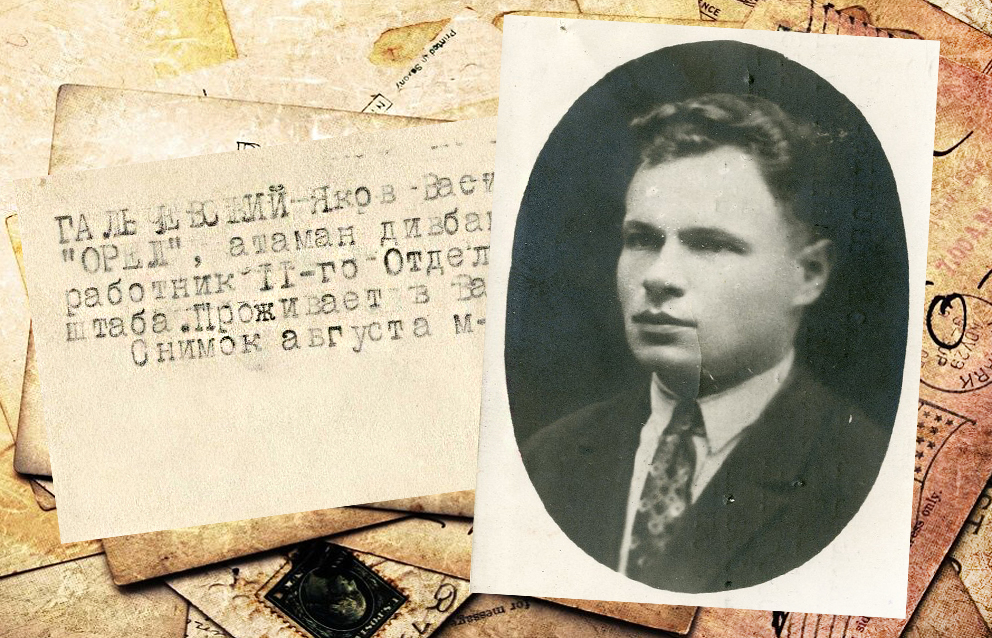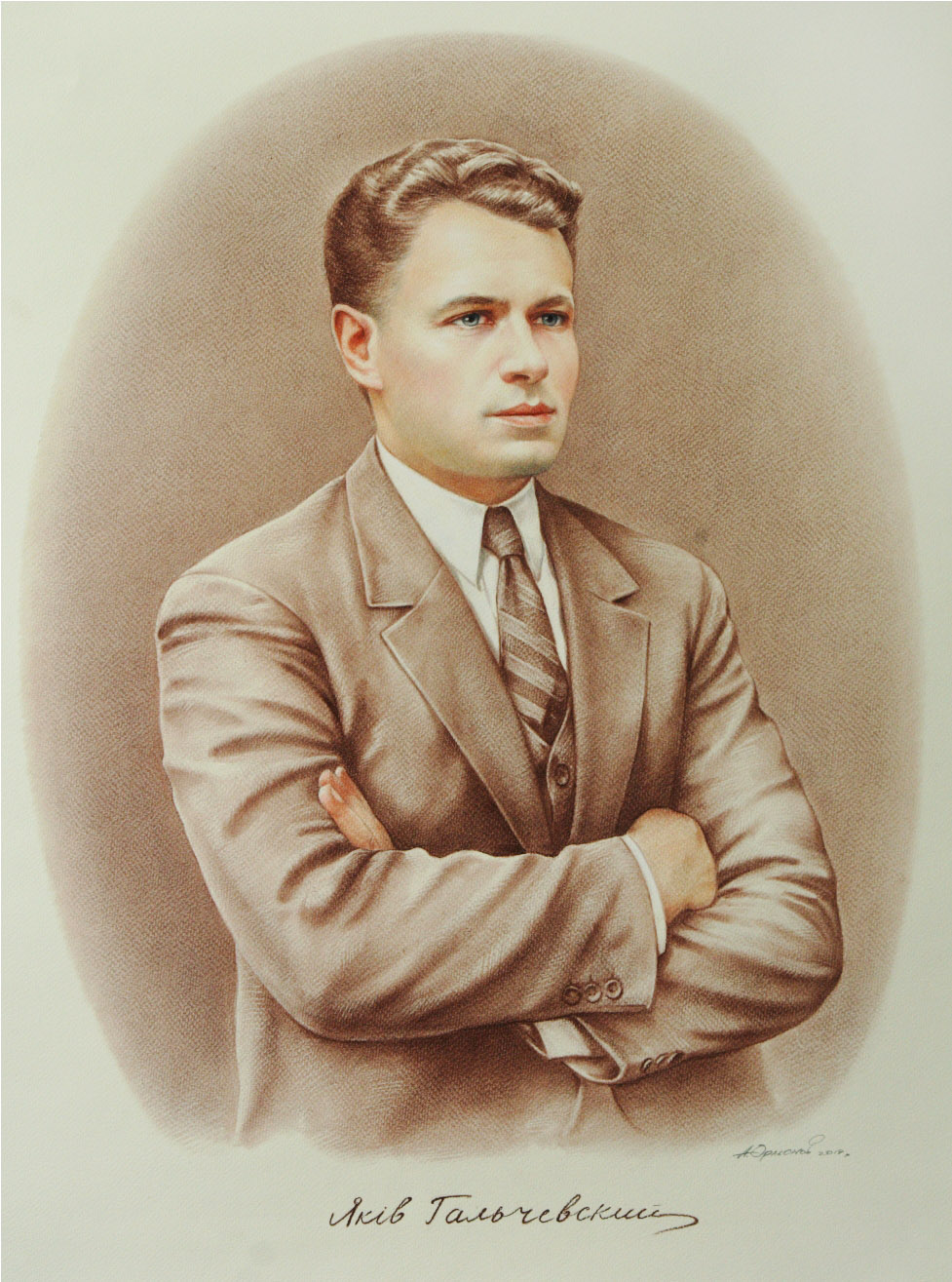Insurgent Otaman Orel
3/19/2021

Sotnyk (Captain - Transl.) of the Army of the Ukrainian People's Republic Halchevskyi Yakiv Vasylyovych (Otaman Orel, Voynarovskyi, Pravoberezhets) was born on October 22, 1894 in the village of Huta-Litynska (now the village of Malynivka, Lityn district, Vinnytsia region) in an ordinary peasant family. Having graduated from a two-grade teachers training school in September 1913, he began teaching at the church-parish school in the village of Sakhny, Letychiv district. He was known as a capable, talented teacher with good prospects, who sought to educate students on the basis of Ukrainian patriotism.
 But the teaching did not last long. In 1915 he was mobilized into the army. Having graduated from the Zhytomyr School of Warrant Officers, he fought at the fronts of the First World War. He was wounded, shell-shocked, gassed. Rose to the rank of Staff Captain (Junior Captain- Transl.). For heroism in battles Halchevskyi was awarded the Order of St. Stanislaus 3rd class with swords and bow, the Order of St. Anne 3rd class with swords and bow and the Order of St. Anne 4th class.
But the teaching did not last long. In 1915 he was mobilized into the army. Having graduated from the Zhytomyr School of Warrant Officers, he fought at the fronts of the First World War. He was wounded, shell-shocked, gassed. Rose to the rank of Staff Captain (Junior Captain- Transl.). For heroism in battles Halchevskyi was awarded the Order of St. Stanislaus 3rd class with swords and bow, the Order of St. Anne 3rd class with swords and bow and the Order of St. Anne 4th class.
The revolutionary events of 1917 made significant adjustments to Halchevskyi's further life. He took an active part in the Ukrainization of Russian army units. After demobilization he returned to teaching. For some time he taught, then was a School Head Master in the village of Brusleniv.
After the declaration of Ukraine's independence, Yakiv Halchevskyi was elected a member of the district school council. At the same time, he joined the Ukrainian National Union, uniting like-minded people who cared about the future of Ukraine and were ready to defend it with arms in hand.
As a participant in the national liberation movement, he became famous in early 1919, when together with Otaman Ananiy Volynets he took part in the liquidation of the Bolshevik uprising against the Directory of the Ukrainian People's Republic - the so-called Medzhibozh Republic. In April of the same year (already in the rank of Sotnyk) he took over from Volynets the command of the Symon Petliura 61st Infantry Regiment of the UPR Army. During that period he fought against units of the Red Army in Podillya and in the territory of Kyiv province.
At the end of the 1922's summer he commanded the Podilsk insurgent group, which consisted of 4 Cavalry Brigades and the Ivan Bohun Hundred. He repeatedly had armed clashes with food-requisition detachments, punitive units of the Podilsk regional Cheka, units of the so-called Red Cossacks, Kotovsky's and Osadchy's Divisions, Primakov's Corps, and the Samara (Bashkir) Division.
It was then that Chief Otaman Symon Petliura promoted Captain Yakiv Halchevskyi to the rank of Colonel of the UPR Army and ordered him to embrace command of all insurgent units in the Right-Bank Ukraine.
Soon, according to the ancient Cossack custom, Halchevskyi took the pseudonym Orel (Eagle- Transl.). But for the success it was not enough to attack suddenly and disappear in surrounding forests unnoticed. He began to improve the tactics of underground insurgent warfare, a significant place in which was given to well-established intelligence and counterintelligence. The commander of the insurgents had his agents and informants in units of the Red Army (even at the level of commanders of regiments and brigade headquarters), in the Cheka, in food-requisition commissions, among railway and telegraph workers and among employees of economic institutions. He created a network of agents in his insurgent units, who informed him about the moods of insurgents, behavior of the otamans, cases of violation of discipline.
At the end of March 1925, Orel and a small group of comrades-in-arms tried to raise a revolt in Podillya, but to no avail. Then he went to the western Ukrainian lands, which at that time were under Poland, with the intention to continue to fight the Bolshevik regime, but in new conditions. For convenience, he settled in the Volyn town of Korets near the border, where he created an intelligence centre on the instructions of the leadership of special services of the State Center of the Ukrainian People's Republic in exile. Later, a similar centre under his leadership began to work in Lanivtsi.
In the documents of the GPU of the USSR of that period, Halchevskyi was repeatedly mentioned as an insurgent Otaman, an active Ukrainian counter-revolutionary, and a representative of the UPR's intelligence in Volyn.

The All Points Bulletin on Orel-Halchevskyi' Insurgent Work, dated August 1926, states: “Orel-Halchevskyi now lives in Poland under the name Bazylevych. Recently, he often comes to Husiatyn and Kopychyntsi… ”And further in the document it is said that he prepared and sent to Ukraine four people to organize underground work and gather information about the Soviet authorities and the Ukrainian population's moods (Branch State Archives of the SZR Ukraine. - F.1.— Case. 9235. - Vol. 1. - P. 243).
In the files of the GPU of that time, Yakiv Halchevskyi was listed as one of the most dangerous enemies of the Bolshevik regime. Hunting for him and tracking his activities were given special importance. A document entitled “On Next Tasks in Working with the Active Ukrainian Counter-Revolution” dated 1929 was found in the archives of the Foreign Intelligence Service of Ukraine. It is marked “Series K”, “Keep along with the code”, “Only personally to all heads of GPU district departments, border detachments, special branches and DTO OGPU ”. Among the GPU of the USSR's other measures, there is the following point: “To introduce into our work, as a system, planned agent- operational cultivation of insurgent centers in general, and in particular – of those whose former leaders are in Poland and are actively working (Halchevskyi, Vodiany, Kuprienko and others) ”.(Branch State Archives of the SZR of Ukraine. - F.1. - Case. 12617. - Vol. 15. – P. 76–88).
Halchevskyi had been working in intelligence for several years, when he received a new proposal. The leadership of the UPR government in exile tried to constantly keep in sight and somehow organize for future struggle active senior officers like him. To this end, measures were initiated to recruit Ukrainian officers to the army of the countries in whose territory they lived.

Yakiv Halczevskyi also decided to continue his military education and further service in the Polish army, but under a different name. In September 1930 he became Captain of the Polish Army Jakub Wojnarowski. He took this name in memory of Andriy Voynarovskyi, nephew of Hetman Ivan Mazepa. There was some similarity in their lives. Both being in exile did not accept defeat and prepared the ground for their return to Ukraine. Both were hunted by Moscow agents as staunch and implacable enemies.
He was soon sent to the Higher Infantry Courses for Staff Senior Officers, which he successfully completed. At the beginning of WWII, Galchevsky- Wojnarowski commanded the Brodnytsia National Defense Battalion. During the 18 days of the war, he showed extraordinary courage, distinguished himself in the battles against Hitler's troops near the town of Kutno. There are mentions that he was awarded the highest award in Poland – the War Order of Virtuti Militari. But the war ended quickly for Poland. And for Yakiv himself it ended in German captivity.
He was prisoner of war until January 1940. After his release, with the assistance of the leaders of the Ukrainian government-in-exile, he went to his wife to Kholm region. Soon everything he experienced in recent years turned into a manuscript entitled “From a Military Notebook”, which he began in the German camp. And then he wrote a book “Against the Red Occupiers”, the first volume of which was published in 1941 in Krakiv, and the second - in 1942 in Lviv. Besides, he put much effort into writing a historiosophical work on the history and destiny of Ukraine, its friends and enemies, its place and role in the modern world.

”World history has put a cross on the graves of many peoples who were tame, divided inside, weak on the outside and unwilling or unable to fight for their place under the sun,” he wrote these prophetic lines believing in Ukraine's better future. -… We need to get rid of all the negative features acquired in a long non-state life. We need to acquire new, creative features that mark the nations of conquerors, and not to stand in the insanity as an ethnographic mass. Otherwise, our Motherland will become a colony of foreign nations, as it had been very often throughout our history”.
In 1942–1943, Yakiv Halchevskyi became the organizer and commander of the Hrubieszów Povit Self-Defense, which defended Ukrainians from all forms of Poles' oppression in the Kholm region. But not everyone liked it. March 21, 1943, the Otaman, who defended the freedom and independence of both Ukraine and Poland with arms in hand, was killed in fighting with the militants of the Armia Krajowa in the village of Peresołowice, Hrubieszów Povit, Lublin Voivodeship. He was buried in Hrubieszów (Poland). In Ukraine, streets and alleys in the city of Khmelnytskyi are named after Halchevskyi, a memorial was erected in his homeland, and in 1994 the Yakiv Halchevskyi Prize “For Heroism in State-Building” was established.
(In the photo - Yakiv Halchevskyi, Branch State Archives of the SZR of Ukraine. - F.1. - File 1812. - Vol. 1. – P. 21; drawing with the image of Yakiv Halchevskyi - the work of artist Artur Orlyonov for an exhibition at the Foreign Intelligence Service of Ukraine, dedicated to the intelligence officers of the UPR era).
